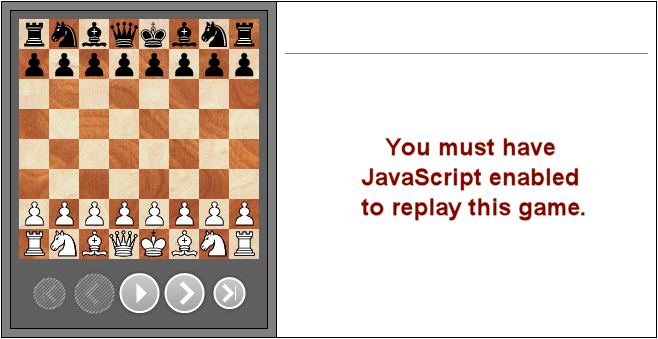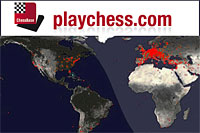The time control in the GP tournaments is 100 minutes for the first 40 moves, 50 minutes for the next 20 moves and then 15 minutes for the rest of the game plus an additional 30 seconds per move starting from move one.
The first leg, in Sharjah, will be held February 18 - 27 (with a rest day on the 23rd) at the Sharjah Cultural & Chess Club. The first prize is €20,000; the total prize fund is is €130,000.
2017 Sharjah GP Participants

All photos by Max Avdeev
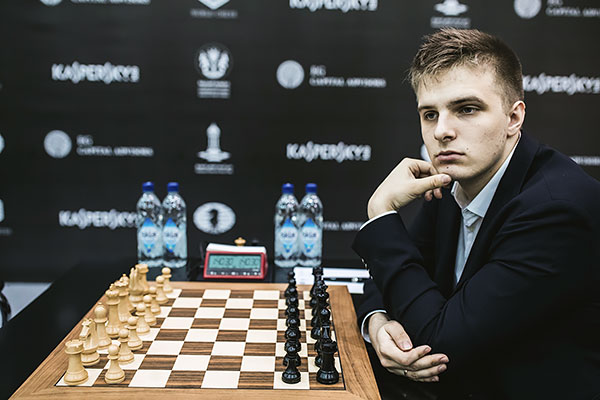
Richard Rapport was a little more subdued in round five, as he licked his wounds from a difficult first half
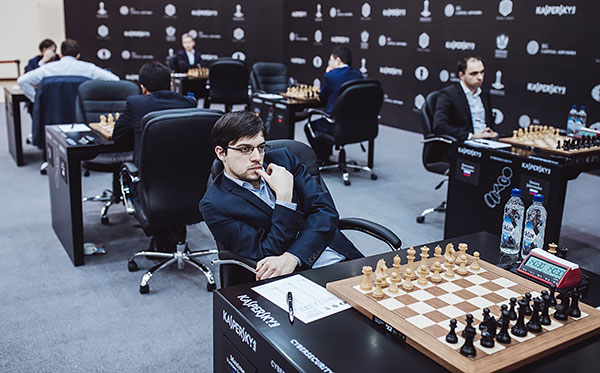
The players await the start, ready to do battle
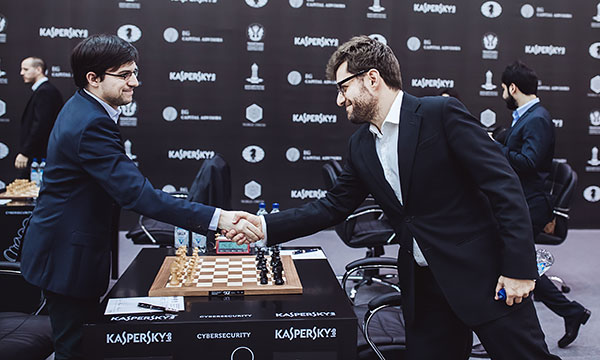
Friendly handshakes before the game, but don't kid yourself. That is where the friendship ends.
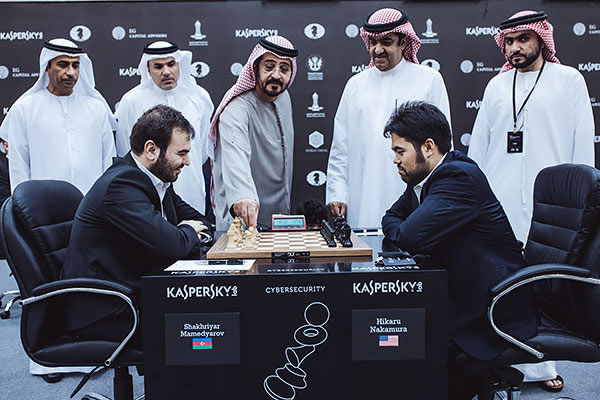
The top board was of course Mamedyarov, with a sterling start, facing Nakamura
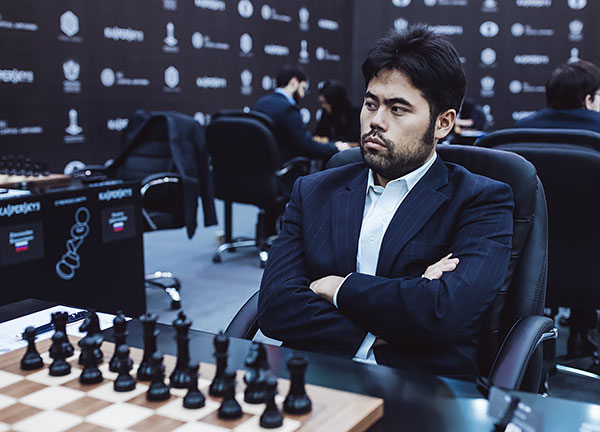
The American got a good position against the Azeri, but somwhere along the line it fizzled out
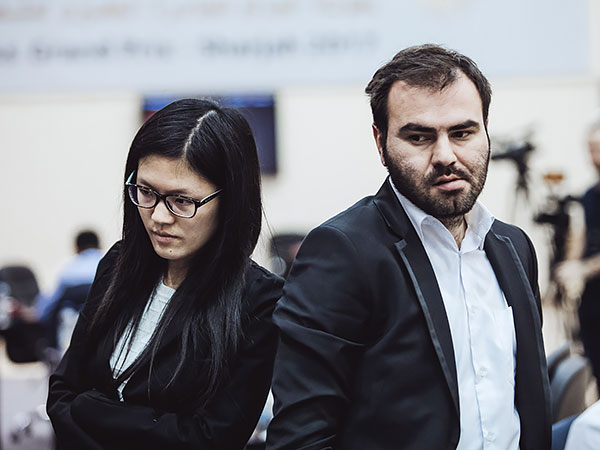
Two of a kind: both Hou Yifan and Shakhriyar Mamedyarov are noted for their extreme aggression on the board
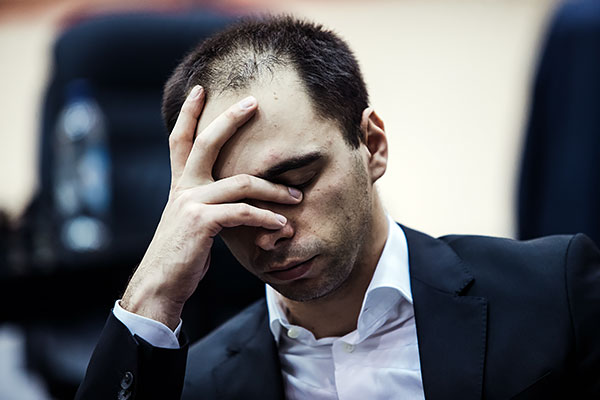
It was a rough day for Alexander Riazantsev (above), who hoped that he could reproduce his memorable win over Jakovenko from the Russian Championship. Alex Yermolinsky recounts the dramatic game that helped clinch the title for Riazantsev. "These two met in the last round of last year's Russian Superfinal. If memory serves Riazantsev was in a share of first with Fedoseev half a point ahead of Grischuk, Tomashevsky and Jakovenko himself. The stage was set for drama, and the drama ensued. Grischuk and Tomashevsky win their games, while the young Fedoseev gambles and loses to another youngster Oparin. In the meantime our heroes play a topical line of the Caro-Kann..."
Jakovenko - Riazantsev, Russian Championship 2016 (annotated by Alex Yermolinsky)

[Event "69th ch-RUS 2016"] [Site "Novosibirsk RUS"] [Date "2016.10.27"] [Round "11.3"] [White "Jakovenko, D."] [Black "Riazantsev, A."] [Result "0-1"] [ECO "B12"] [WhiteElo "2714"] [BlackElo "2651"] [Annotator "Alex Yermolinsky"] [SetUp "1"] [FEN "r3k2r/1pqnnpb1/2p1p2p/p2pPbp1/P2P4/1N3N2/1PPBBPPP/2RQ1RK1 w kq - 0 12"] [PlyCount "5"] [EventDate "2016.10.16"] [EventType "tourn"] [EventRounds "11"] [EventCountry "RUS"] [EventCategory "18"] [SourceDate "2016.10.31"] [SourceVersion "1"] [SourceVersionDate "2016.10.31"] [SourceQuality "2"] 12. Ne1 ({Known is} 12. Qe1 O-O) 12... c5 13. c3 $6 {Seriously? Is this how a 2700+ plays in a must win situation with the Championship title at stake?} ({Whatever happened to stuff like} 13. c4 cxd4 14. Nxd4 dxc4 15. Nb5 {etc?}) 13... c4 14. Na1 {That knight will move again, some ten moves later, when Black is already firmly in control. Riazantsev wins the games in 40 moves and captures his first Russian Championship title. There was another record of these guys playing to a 7-move draw in the Russian Rapid Championship in December 2016. Funny thing is, it was in the last round again. This time it was Jakovenko in second place and Riazantsev in third, a half-point behind him. The leader, Dubov, was already out of reach, but wasn't second place worth fighting for? Judging by all that, these two seem bosom buddies, so I suggest tournament organizers should take heed.} 0-1
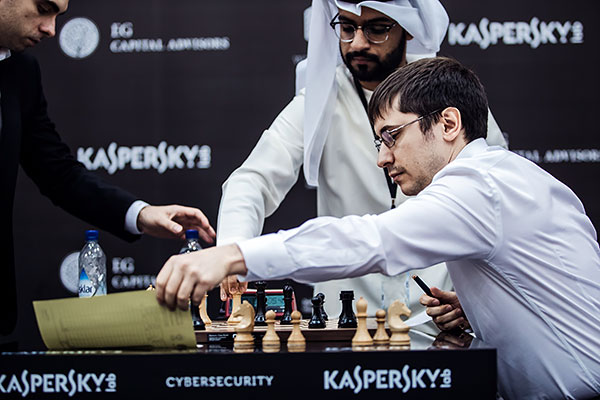
Fast forward now to Sharjah in 2017...
Riazantsev - Jakovenko, Sharjah FIDE GP 2017 (annotated by Alex Yermolinsky)

[Event "FIDE Grand Prix I"] [Site "Sharjah"] [Date "2017.02.22"] [Round "5"] [White "Riazantsev, A."] [Black "Jakovenko, D."] [Result "0-1"] [ECO "B13"] [WhiteElo "2671"] [BlackElo "2709"] [Annotator "Alex Yermolinsky"] [PlyCount "38"] [EventDate "2017.02.18"] [EventType "swiss"] [EventRounds "9"] [EventCountry "UAE"] 1. c4 c5 2. Nf3 Nc6 3. e3 Nf6 4. d4 cxd4 5. exd4 d5 6. Nc3 Bg4 7. cxd5 Nxd5 8. Qb3 Bxf3 9. gxf3 e6 10. Qxb7 Nxd4 11. Bb5+ Nxb5 12. Qc6+ ({Note the old move order} 12. Qxb5+ Qd7 13. Nxd5 exd5 14. Qb3 $2 {and here Black can still castle. } (14. Qxd7+ Kxd7 15. Be3 Bb4+ 16. Ke2 Rhc8 {was played a million times before, and most games ended in draws.})) 12... Ke7 13. Qc5+ $1 {The authorship of this idea belongs to Grischuk, who used it against Vidit in World Rapid, Doha 2016.} ({The main line} 13. Qxb5 Qd7 14. Nxd5+ Qxd5 15. Qxd5 exd5 16. Be3 { leaves the black king awkwardly placed on e7, but he still recovers with} Ke6 { successfully defending most of the time.}) 13... Ke8 ({How valid it is remains to be seen until somebody tries to punish White by keeping the extra piece:} 13... Nd6 14. Nxd5+ exd5 15. Qxd5 {White has compensation, and the rest is going to be computer analysis, while I have nothing else to say about this position.}) 14. Qxb5+ Qd7 15. Nxd5 exd5 16. Qb3 {Now we go back to the note after White's 12th, and, hey, you can't castle now!} ({The above mentioned stem game went} 16. Qd3 {Certainly, a better square for the queen.} Bb4+ 17. Kf1 f6 18. Kg2 Kf7 19. Bf4 Ba5 20. Rhd1 Rad8 21. Rac1 $14 {Grischuk won in 39 moves.}) 16... Bd6 17. O-O Rb8 {Black gains a free tempo} 18. Qe3+ Kf8 19. Rd1 $4 ({It is anyone's game after} 19. Re1 h5 {but I prefer Black by a small margin.}) 19... Qh3 {This is how it ends. Tragic blunder, you say. Maybe, karma?} (19... Qh3 20. f4 Qg4+ {picks off that unfortunate rook.}) 0-1

Alex Yermolinsky chose the games to annotate and in his analysis of Grischuk's win over Eljanov, will not hesitate to cite from memory Pillsbury, Tal, Fischer and Anand and Carlsen for good measure, and what their connection to the game is.
Grischuk - Eljanov (annotated by Alex Yermolinsky)

[Event "FIDE Grand Prix I"] [Site "Sharjah"] [Date "2017.02.22"] [Round "5"] [White "Grischuk, A."] [Black "Eljanov, P."] [Result "1-0"] [ECO "D38"] [WhiteElo "2742"] [BlackElo "2759"] [Annotator "Alex Yermolinsky"] [PlyCount "97"] [EventDate "2017.02.18"] [EventType "swiss"] [EventRounds "9"] [EventCountry "UAE"] 1. d4 Nf6 2. c4 e6 3. Nf3 d5 4. Nc3 Bb4 {Black combines the ideas of the Queen's Gambit Declined and the Nimzo Indian into a complex setup, called the Ragozin Defense.} 5. cxd5 ({Actually, most games played by Viacheslav Ragozin went} 5. Qa4+ Nc6 {so the black c7-pawn didn't get into action early as the modern treatment of this opening demands.}) 5... exd5 6. Bg5 h6 7. Bh4 O-O ( 7... g5 {used to be the main move here.} 8. Bg3 Ne4 9. Nd2 Nxc3 ({There's something to be said in favor of} 9... Nxg3 10. hxg3 c6 {Black gets his bishop pair at the cost of weakening his K-side.}) 10. bxc3 Bxc3 11. Rc1 {here Black holds the balance after the crafty move} Bb2 $1 {first found by Tal and lately used by Aronian.}) ({Lately, the most attention was focused on} 7... c5 { which, incidentally, was introduced by R.J. Fischer in the early 1960's.} 8. e3 ({White can try to interfere with Black's plans by} 8. dxc5 {but then} Nbd7 9. e3 Qa5 {was upheld by both Anand and Carlsen in 2014, and later this line gained a new supporter in Yu Yangyi. I guess Black isn't doing so badly there.} ) {and then Black without further ado plays the bold} 8... c4 $1 {What to make of this structure? White has to try for e3-e4, but it's easier said than done. One modern example is a rapid game Duda-Wojtaszek, 2015:} 9. Nd2 g5 $1 10. Bg3 Nc6 11. Be2 Bf5 12. a3 Bxc3 13. bxc3 O-O 14. O-O b5 15. f3 Re8 16. Bf2 Bg6 17. Qc1 a5 18. Re1 b4 19. e4 {with extreme complications.}) 8. e3 Bf5 {Now as g7-g5 became less attractive (king safety issues) Black still has to try for more than just a meek transition to a Queens Gambit Exchange Variation.} (8... Be7 $2 9. Qc2 {gives White an extra tempo in a familiar pawn structure.}) ({ The solution once again can be seeked in active counterplay:} 8... c5 9. Bd3 c4 10. Bc2 {White's LSB is much handier on the b1-h7 diagonal.} Nbd7 11. O-O Qa5 12. Ne2 Re8 13. b3 Ba3 $1 14. bxc4 dxc4 {as once played by GM Kacheishvili.}) 9. Qb3 {White is trying to hit both d5 and b7 to underline the problem with Black's previous move.} ({A rather innocuous looking} 9. Bd3 {nonetheless brought White success in Ragger-Inarkiev, ECC 2016:} Bxd3 10. Qxd3 Nbd7 11. Ne5 {
} Qe8 12. O-O c6 13. Nxd7 {} Nxd7 14. a3 Bd6 15. e4 {Black's pieces are awkwadly placed here.}) 9... Bxc3+ ({ I'm curious about} 9... Nc6 $5 {Black is going full Ragozin.} 10. Be2 (10. Bb5 Rb8) 10... g5 11. Bg3 Ne4 12. O-O Bxc3 13. bxc3 Qd7 14. Rac1 (14. Qxb7 Rab8 15. Qxc7 Qe6 {is very uncomfortable for the white queen.}) 14... Na5 15. Qb4 b6 { That light square blockade has a chance here, isn't it?}) 10. bxc3 Nbd7 11. Be2 c5 {All standard issue, and here Grischuk played a new move.} 12. dxc5 { Up to this point the players were following Ding Leren-Leko, 2016} ({which saw } 12. O-O c4 {We already know the strength of this pawn push working together with the black bishop controlling the b1-h7 diagonal.} 13. Qb2 Qb6 $11) 12... Nxc5 13. Qb4 Nce4 ({Pavel took over 20 minutes contemplating} 13... Nd3+ 14. Bxd3 Bxd3 15. Qd4 Ba6 {and decided against it. Indeed, he had to look ahead to} 16. Bxf6 {and decide how to recapture. Both options are testing.} gxf6 { seems the more principled choice.} (16... Qxf6 17. Qxf6 gxf6 18. Kd2 {makes the white king very comfortable, therefore defeating the very purpose of Black's Ba6.}) 17. Qg4+ Kh7 18. Qf5+ Kg7 19. Nd4 Qc7 20. Rc1 Rae8 21. h4 Re5 22. Qf4 Qc4 23. Rh3 {with unclear consequences.}) 14. Nd4 Bh7 15. O-O {White has emerged with a castled king and safe pawn structure. Most 1.d4 players would be content with that. Next order of business is to try for some advantage by preparing c3-c4.} g5 16. Bg3 Qb6 {Eljanov is looking for counterplay against White's split pawns. For that he's willing to double his own pawn, but get the a-file open for the rook. Such strategy is typical for Pavel's active positional style. In this game, however, he met an opponent to match his wits.} 17. Qxb6 axb6 18. Rfc1 Rfc8 19. c4 Nxg3 20. hxg3 Rc5 21. Nb3 $1 Rc7 22. cxd5 Rxc1+ 23. Rxc1 Nxd5 24. Nd4 $1 {White has a small plus based on the fact that his centralized knight is protected by a pawn, while its black counterpart is not.} Bg6 ({Illustration:} 24... Rxa2 $2 {loses to} 25. Bc4 Ra5 26. Nb3) 25. Bb5 Nb4 26. a4 Na6 27. f3 Nc5 28. e4 Rd8 29. Rc4 { Grischuk conducts the game in a classic Capablanca style. His pieces are well enough placed to keep Black from finding counterplay. Now he will bring the king up to complete Stage One.} h5 30. Kf2 f6 31. Ke3 Bf7 32. Rb4 Ra8 33. Ne2 Rc8 $2 {Big misstep from Black.} ({Containing the white rook's activity was a must:} 33... Kf8 $1 {Maybe Pavel worried about} 34. Nc3 (34. Rd4 Ke7) 34... Ke7 35. Be2 {but then Black has a tactical defense,} Rc8 36. Rxb6 $4 Nd7) 34. Rd4 { Alexander seizes his chance.} Be8 35. Rd6 Bxb5 36. axb5 Kf7 37. Nc3 Re8 38. Rxb6 f5 39. Rd6 (39. Kd4 Ne6+ 40. Kd5 {looked more decisive.}) 39... fxe4 40. Nxe4 $2 {This isn't the first time a big advantage slips away in a rook ending. } ({White keeps all the aces with the knights on the board.} 40. fxe4) 40... Nxe4 41. fxe4 Ra8 42. Rd7+ Kf6 $2 {I cannot explain this. Clearly White's main trump is the b-pawn, so Black had to get his king over to help.} ({So, play} 42... Ke6 $1 43. Rxb7 {and then start your typical rook checks:} Ra3+ 44. Kf2 ( {It is not difficult to evaluate} 44. Kd4 Rxg3 45. Rh7 (45. b6 Rxg2 46. Rb8 Rb2 47. b7 Kd7 {safe and sound}) 45... h4 46. b6 Rxg2 47. b7 Rb2 48. Kc5 Ke5 49. Kc6 Kxe4 {reaching a draw with moves to spare.}) 44... Ra2+ 45. Kg1 Rb2 46. b6 Rb1+ 47. Kh2 g4 $3 {The key move to keep the white king out of play forever.} ( 47... Kd6 48. g4 $3 h4 49. Rg7) 48. Rb8 (48. Rh7 Ke5 49. Rxh5+ Kxe4 50. Rh6 Kf5 ) 48... Kd7 49. e5 Kc6 50. e6 Re1 {eliminating White's passers.}) 43. Rxb7 Ra3+ 44. Kd4 Rxg3 45. b6 {Totally different picture now - the black king is late coming over to the b-pawn.} Rxg2 46. Rb8 Rb2 47. b7 $1 {This guarantees a win without the need to get the king involved, as the e-pawn just marches on.} Kg7 48. e5 g4 49. Kc3 1-0

A fine win by Grischuk broke the drawing streak he had been beset with in the first four rounds
Round 5 on 2017/02/22 at 15:00
Round five games (with times per move)
Standings after five rounds
| Rk |
SNo |
Ti. |
Name |
FED |
Rtg |
Pts |
| 1 |
1 |
GM |
Vachier-Lagrave Maxime |
FRA |
2796 |
3,5 |
| 2 |
4 |
GM |
Mamedyarov Shakhriyar |
AZE |
2766 |
3,5 |
| 3 |
7 |
GM |
Adams Michael |
ENG |
2751 |
3,0 |
| 4 |
12 |
GM |
Jakovenko Dmitry |
RUS |
2709 |
3,0 |
| 5 |
9 |
GM |
Grischuk Alexander |
RUS |
2742 |
3,0 |
| 6 |
3 |
GM |
Nakamura Hikaru |
USA |
2785 |
3,0 |
| 7 |
5 |
GM |
Ding Liren |
CHN |
2760 |
2,5 |
| 8 |
10 |
GM |
Li Chao B |
CHN |
2720 |
2,5 |
| 9 |
2 |
GM |
Aronian Levon |
ARM |
2785 |
2,5 |
| 10 |
13 |
GM |
Vallejo Pons Francisco |
ESP |
2709 |
2,5 |
| 11 |
17 |
GM |
Hou Yifan |
CHN |
2651 |
2,5 |
| 12 |
8 |
GM |
Nepomniachtchi Ian |
RUS |
2749 |
2,5 |
| 13 |
14 |
GM |
Rapport Richard |
HUN |
2692 |
2,0 |
| 14 |
18 |
GM |
Hammer Jon Ludvig |
NOR |
2628 |
2,0 |
| 15 |
15 |
GM |
Riazantsev Alexander |
RUS |
2671 |
2,0 |
| 16 |
6 |
GM |
Eljanov Pavel |
UKR |
2759 |
2,0 |
| 17 |
11 |
GM |
Tomashevsky Evgeny |
RUS |
2711 |
1,5 |
| 18 |
16 |
GM |
Salem A.R. Saleh |
UAE |
2656 |
1,5 |
Live Commentary
AGON is offering exclusive pay-per-view video of the games and live commentary. It comes in three packages: a one-time $10 fee just for Sharjah GP, a full package of all the events in the World Championship cycle for $30, and a $250 package, which is the same as the $30 Base but comes with signed posters from each event.
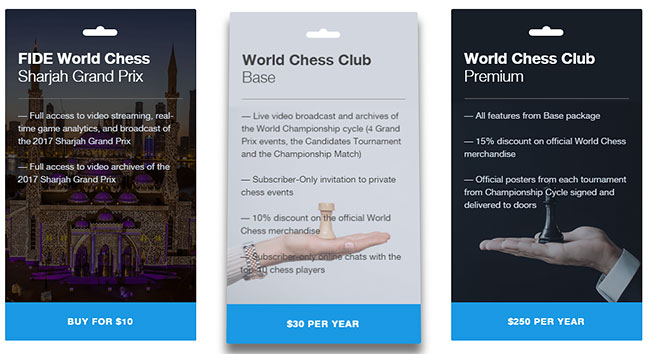
For more information, see the widget on the main page.






























